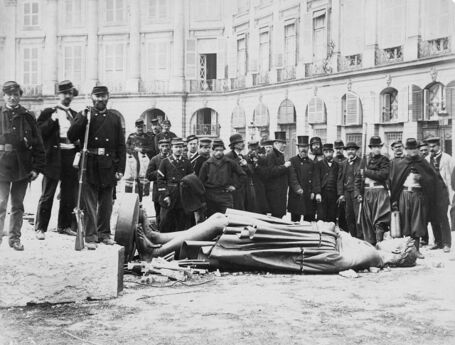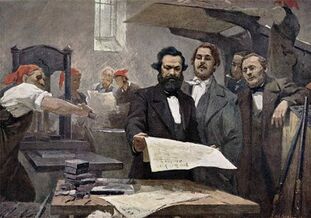Dictatorship of the proletariat
The revolutionary dictatorship of the proletariat (DOTP) is a Marxist concept which describes a temporary state form constructed in the transition period of social reconstruction which is effected by a socialist revolution. The DOTP is necessary for the socialization of the means of production and the implementation of large-scale economic planning.[1] This amounts to a transition from the capitalist to the communist mode of production.
Etymology and meaning
The use of the term dictatorship is a source of disagreement among some readers of Marx. Some Marxists[citation needed] argue that every class society is at base a dictatorship of the ruling class under which legal and social organization is only a tool for mediating social conflict. Capitalist society is itself a dictatorship of the bourgeoisie, in which the ruling classes regularly abuse their own legal precedents and commit crimes which are never held accountable precisely because of the importance of this extralegal suppression in maintaining the unstable class structure. Indeed, by carrying out the bourgeois revolutions, the revolutionary bourgeois class suspended the feudal ruling class's capricious abuse of the spirit of the law, especially as represented by the impudent laws of kings Charles I of England and Louis XVI of France. In this sense, every class system is a form of extralegal oppression, and this system must be forcibly replaced with a democratic one:
A revolution is certainly the most authoritarian thing there is; it is the act whereby one part of the population imposes its will upon the other part by means of rifles, bayonets and cannon — authoritarian means, if such there be at all; and if the victorious party does not want to have fought in vain, it must maintain this rule by means of the terror which its arms inspire in the reactionists.
— Engels, On Authority[2]
Marx and Engels were both perfectly clear that the dictatorship of the proletariat had to have a democratic character achieved through universal suffrage in combination with the suppression of the undemocratic power relations inherent in inequalities of land and income. Discussion of the details of this political system typically draws on the example of the Paris Commune, which Engels himself highlighted:
Well and good, gentlemen, do you want to know what this dictatorship looks like? Look at the Paris Commune. That was the Dictatorship of the Proletariat.
— Engels, [citation needed]
It is for this reason that Lenin and other Marxists define equality of pay for elected representatives and the right of recall (both of them policies of the Commune) as essential to the political form of the DOTP. However, critics such as Paul Cockshott argue that this is a deficient and outdated position which does not take into account the lessons to be learned from places, including not only the Commune and the USSR but the United States and the PRC, where these policies have already been implemented.[citation needed]
During the French Revolution, the idea of a temporary, revolutionary dictatorship became a part of the program of the Jacobins and "Conspiracy of Equals." However, their conceptions of dictatorship differed from that of Marx's, in that instead of advocating a direct dictatorship of the people, they advocated a dictatorship of the people's interests. The Jacobins established a fanatical revolutionary regime and initiated the infamous "Reign of Terror," with the intent of purging the country of all counter-revolutionaries and foreign agents. Following the overthrow of the Jacobins, a new society advocating revolutionary dictatorship emerged, the aforementioned "Conspiracy of Equals." While not using the term "dictatorship," their programs made clear that they advocated a closed dictatorship of revolutionaries. Yet their motives for such a dictatorship were not so much in paranoia as the Jacobins, but in concern for the masses, whom they feared were too conservative and unenlightened for revolutionary purposes. Their platform promised the eventual establishment of a democratic republic, but only once the preceding dictatorial government recognized them as "enlightened."
While Marx and Engels admired their dedication to the proletariat, they dismissed these notions of conspiratorial and exclusive organization. Marx formulated the dictatorship of the proletariat not as an emergency termination of democracy but as the extension of the democracy of the previous regime:
One thing that is absolutely certain is that our party and the working class cannot achieve rule except under the form of the democratic republic. This latter is even the specific form of the dictatorship of the proletariat, as the Great French Revolution already showed.
— Engels[citation needed]
Hal Draper
The Marxist Hal Draper produces a similar analysis which differs on important points. Marx used the term dictatorship in its original sense as used in Roman law. In the Roman Republic, the dictator (“one who dictates”), was an extraordinary magistrate (magistrātus extrāōrdinārius) with the absolute authority to perform tasks beyond the authority of the ordinary magistrate (magistrātus ōrdinārius). The office of dictator was a legal innovation originally named Magister Populī ("Master of the People"), i.e., Master of the Citizen Army. The "dictator" possessed these powers only for the duration of the civil insurrection that he was meant to crush. The word dictatorship in the sense that Marx used it in inherently conveyed the meaning of temporary powers.[3] Hence, Marx speaks of a "dictatorship of the bourgeoisie" only by specifically referencing Cavaignac: "he was the dictatorship of the bourgeoisie".[citation needed] Cavaignac crushed a workers' uprising and relinquished power after he had done so, consistent with the use of dictatorship in that time period. The term 'dictatorship' does therefore not convey oppression or subjugation as is sometimes argued, and Draper argues on this basis[citation needed] that the dictatorship of the proletariat (a sort of temporary emergency measure) cannot be equated with general bourgeois class rule (indefinite). According to Draper, only later did Marxists such as Lenin come to use it generally, referring to all bourgeois class rule as a dictatorship of the bourgeoisie.
The dictatorship of the proletariat is also referred to as the revolutionary dictatorship, proletarian dictatorship. It can also be referred to by other names depending on the political form equated with the dictatorship of the proletariat, such as a "workers' republic" or "workers' state".
Party
Some orthodox Marxists have argued that the dictatorship of the proletariat may be intra-party organs within a mass party-movement of the majority of the working class.
Amadeo Bordiga considers the Communist Party the organic unity of the proletariat. The dictatorship of the proletariat is therefore the dictatorship of the communist party. The Party would assume power and as the state withers away the Party would be transformed into a central administration that would be responsible for decision-making on the basis of the scientific method. Neither the Party nor the central administration would be subject to democratic control arguing that majority decision-making does not make it the correct decision. The correctness of decisions would be established on the basis of science.[4]
Withering away of the state
The withering away of the state was first used by Friedrich Engels in Anti-Dühring: "State interference in social relations becomes, in one domain after another, superfluous, and then dies out of itself; the government of persons is replaced by the administration of things, and by the conduct of processes of production. The state is not "abolished". It dies out [It withers away]."[5]
The state originated from class society and class antagonisms. The revolutionary dictatorship is the body of class rule against the bourgeoisie and its reaction. The withering away of the state occurs because of the disappearance of class antagonisms and the abolition of social classes. The revolutionary dictatorship uses coercion against the reaction to consolidate its power, as the reaction is beaten these types of coercive functions of the workers' state gradually disappear proportionally to the intensity of the reaction (as the reaction dwindles, so does the coercion employed). The working class organs of the revolutionary dictatorship are organically transformed into administrative organs of free association of equal individuals. The state disappears not because of a voluntary abdication of power by the ruling class but because the specific organs for class rule are transformed into organs of voluntary association around common ownership.
References
- ↑ It "gives [the] socialized character [of production the] complete freedom to work itself out. Socialized production upon a predetermined plan becomes henceforth possible". Engels. Socialism: Utopian and Scientific. Chapter III - Historical Materialism
- ↑ On Authority, by Engels, Friedrich, 1872.
- ↑ Hal Draper, 1987. The 'Dictatorship of the Proletariat' in Marx and Engels
- ↑ John CRUMP. Non-market socialism in the nineteenth and twentieth centuries. Houndmills, Basingstoke, Hampshire : Macmillan, 1987. https://bataillesocialiste.wordpress.com/english-pages/1987-bordigism-buick/
- ↑ Engels, F. (1877). Anti-Dühring. https://www.marxists.org/archive/marx/works/1877/anti-duhring/ch24.htm

